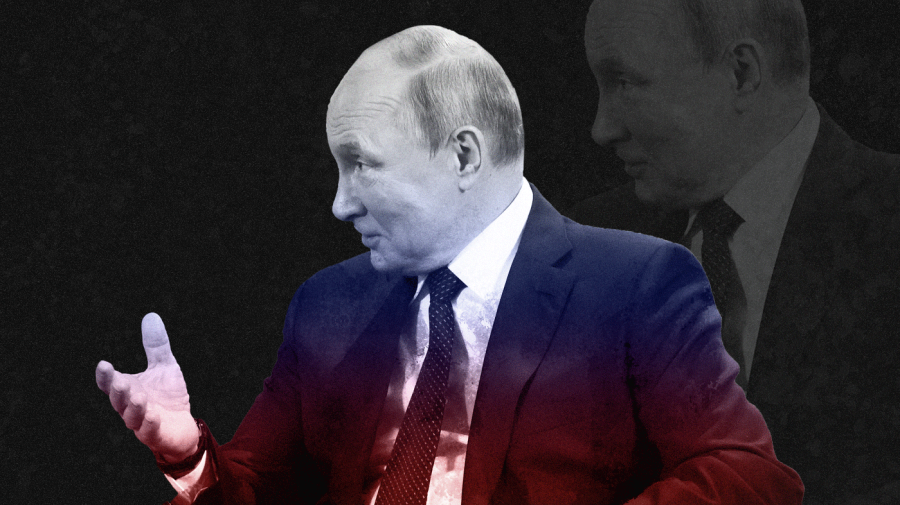
Signs of frustration with Russian President Vladimir Putin’s war in Ukraine are mounting, posing the most serious challenge yet in retaining his firm grip on the Kremlin.
The stunning counteroffensive by Ukrainian forces has forced Russian troops to flee occupied areas, leading to questions about Russia’s strategy on state television airwaves normally under Putin’s thumb.
Local lawmakers in Putin’s hometown of St. Petersburg have called for his removal from office, while Chechen leader Ramzan Kadyrov, a close Putin ally, called Russia’s retreat this week “astounding.”
Russian experts say it all leaves Putin at the center of a political quagmire of his own making, which threatens his popularity and, in the longer term, quite possibly his political survival.
The odds of Putin losing power are higher than ever, though still “not a very large number,” said Timothy Frye, a Columbia University political science professor who wrote “Weak Strongman: The Limits of Power in Putin’s Russia.”
“Putin risked the most important achievement of his 20 years in power by going to war in Ukraine. And that was a sense of a return to stability,” Frye said. “And the expectation was the war would be over in a week — this would be seen as an easy victory and that stability would not be put in jeopardy. And now, it clearly has.”
Putin, who has refused to label the conflict in Ukraine as a war even after tens of thousands have died, has few attractive choices going forward. That raises the possibility that his “special military operation” in Ukraine will drag on.
“Putin, for all his macho persona, he’s not good at making tough decisions,” said Mark Galeotti, a London-based lecturer on Russian security and author of the forthcoming book “Putin’s War.” “When he doesn’t see a good answer, he tends to get paralyzed. And at the moment he doesn’t really have any good options.”
Putin has avoided instituting a draft to shore up Russian forces, for fear it would hurt him domestically. Suing for peace, Galeotti said, would likewise be politically disastrous.
“So he’s probably just going to muddle along and basically hope that either Ukraine self-destructs or the West loses interest in supporting it,” he said.
That’s been Russia’s hope and Ukraine’s dread before, but it seems more unlikely than ever at the moment.
Ukraine’s gains around Kharkiv have only emboldened Kyiv and Western support for its resistance. Anne Applebaum, a Russian historian and journalist, argued this week in The Atlantic that Ukraine’s liberation of some 6,000 square kilometers of occupied territory is cause to prepare for Ukraine’s victory and possibly Putin’s downfall.
On state TV this week, talking heads were debating why the “special military operation” was failing — generally placing blame with the military generals advising Putin — while anchors reported solemnly that it was the toughest week of the war so far.
“That in itself was kind of revelatory and like, wow, I wasn’t expecting that in this kind of make-believe world that they have over there,” said Mark Schrad, who directs Russian Area Studies at Villanova University’s Department of Political Science.
However, Schrad argued in a piece for Foreign Policy this week that predictions of Putin’s downfall were premature. He noted that Western forecasts of Putin’s imminent ouster have come and gone throughout his time in office — and that while the Ukraine war posed unprecedented risks, Putin was deploying unprecedented measures to maintain control and silence dissent.
“I could be wrong, but I don’t think it’s existential,” he said of the challenges that Putin faces if losses continue in Ukraine. “I think it would be an embarrassment, you know, certainly. And certainly wouldn’t be good for his popularity.”
“But the idea that, you know, the sort of this exuberance that we’re seeing, that in the short term it will necessarily translate into sort of immediate political change, that’s where I would kind of tap the brakes, you know, to try not to get too far ahead of our skis,” he added.
Even if Putin does take a deep and sustained hit to his popularity over the Ukraine war — among the masses or within elite circles — it doesn’t necessarily spell doom for him politically, Frye said.
“People often conflate leaders becoming weaker in their ability to accomplish their goals with the possibility of them losing office. And those two things are often different. And dissatisfaction among the elites in the masses doesn’t necessarily lead to action,” Frye said.
“I think that’s the most likely situation going forward, given the current trajectory of the war, that for the moment, Putin’s position is not in danger, but his ability to get the public to go along with things he wants to do, and to get elites to sacrifice their own interests in order to serve Putin’s agenda, that’s just going to be much harder.”
Instability is increasingly being felt throughout Russia’s society and economy. Bloomberg reported this month on an internal Kremlin document predicting Russia’s economy shrinking by up to 10 percent in the coming years, compared to 2021 levels, and potentially only returning to pre-war footing near the end of the decade.
And though there is scant polling of popular opinions toward Putin’s war, Russians have consistently shown negative attitudes toward sending troops into foreign conflicts, noted Frye.
Yet the most significant threat to Putin is losing support of the elites — in the security services, the private sector and regional power brokers — said Chris Miller, an associate professor at Tufts University who specializes in Russian history. At the moment, Putin is seeking to balance between hawks who want to see him double down in Ukraine, and doves, who would like to see movement toward a peace settlement.
“He sees a middle path and I think we should expect elites to give him the benefit of the doubt to pursue for the coming months,” Miller said. “The war is not going nearly as well as they might have hoped. But it’s manageable for the next couple of months, and other than those who want escalation there aren’t many other great ideas coming out of the Russian policymaking process about what to do differently that would produce better outcomes from the perspective of the Russian government’s goals in Ukraine.”
Putin also benefits from the lack of an obvious successor. And he has also proven adept at playing elites against each other, wielding a range of tools to keep rebellious elements under control — from punishing officials who deviate from his policy to real fears among business elites that they may meet a mysterious death, he added.
Miller also noted that views toward the war – both inside and outside Russia — were very different just two months ago, when Russia was steadily gaining territory in Ukraine.
“I think the lesson of this war and the lesson of many other wars is that there are many twists and turns,” he said. “Momentum over the course of seven months has changed multiple times already, and we shouldn’t be surprised if it switches again.”
For the latest news, weather, sports, and streaming video, head to The Hill.




